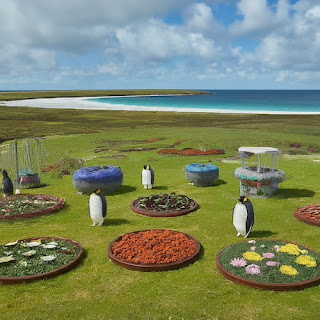Penguin-Friendly Pastures in the Falklands
A Feathered Feast: Penguin-Friendly Pastures in the Falklands
Imagine a scene straight out of the future: rolling green pastures in the Falkland Islands, not grazed by sheep, but teeming with life. This is the vision of Penguin-Friendly Pastures, a revolutionary concept that priorities the well-being of native fauna while promoting biodiversity.
Planning for Success:
Land Selection: Select areas with minimal human activity, close to existing penguin colonies. Prioritise land previously used for sheep grazing to minimise disruption.
Native Flora: Research and plant a diverse selection of native, low-growing flowering plants like foxgloves, daisies, and native grasses. These create a haven for native insects like pollinators, a vital food source for birds.
Feeding Stations: Strategically place automated feeding stations throughout the pastures. These dispensers, powered by solar panels, would offer penguins protein-rich snacks like krill or fish oil supplements.
Tech for a Sustainable Future:
- Motion Sensors: Feeding stations utilise motion sensors to dispense food only when penguins are present, ensuring efficient resource use.
- Remote Monitoring: Cameras and sensors allow researchers to monitor penguin activity and adjust feeding schedules or intervene if necessary.
Building a Penguin Paradise:
- Land Preparation: Remove any invasive plants and ensure the soil is healthy for native flora to thrive.
- Planting Native Flowers: Sow seeds or transplant seedlings in designated areas, creating a diverse pollinator garden.
- Install Feeding Stations: Securely position solar-powered feeding stations throughout the pastures.
- Monitoring and Maintenance: Regularly check on the health of the gardens and functionality of the feeding stations.
Challenges and Solutions:
- Predators: Strategically place nesting boxes and deterrents to keep predators like skuas away from penguin colonies.
- Competition for Food: Monitor penguin activity and adjust food distribution to ensure all penguins have access to sustenance.
- Habitat Fragmentation: Connect existing penguin colonies through corridors of native vegetation, providing safe passage for foraging and breeding.
Daily Routine:
- Remotely monitor penguin activity and food station levels.
- Refill food dispensers as needed, ensuring a consistent supply.
- Conduct regular inspections of the pastures and feeding stations.
Future Benefits:
- Healthy Penguin Populations: Improved food availability and reduced foraging risks can lead to healthier penguin populations.
- Booming Biodiversity: Native pollinator gardens attract insects and birds, promoting a thriving ecosystem.
- Sustainable Tourism: These pastures can become responsible tourist attractions, fostering appreciation for the Falklands' unique wildlife.
Resource Conservation Tips:
- Utilise solar power for feeding stations, minimising reliance on fossil fuels.
- Implement rainwater harvesting systems for watering the pollinator gardens.
- Promote responsible tourism practices to minimise visitor impact on the pastures.
DIY Inspiration:
- Create a small pollinator garden in your backyard using native plants.
- Build a bird feeder and offer a variety of protein-rich snacks for local birds.
- Spread awareness about the importance of habitat conservation and the plight of penguins.
Penguin-Friendly Pastures represent a win-win situation for the environment and the Falkland Islands' economy. By prioritising the well-being of penguins and fostering a healthy ecosystem, this innovative approach paves the way for a future where humans and wildlife can coexist in harmony.




